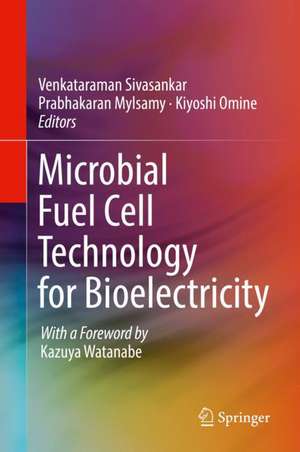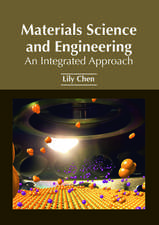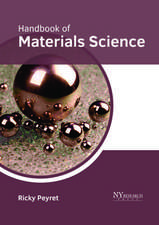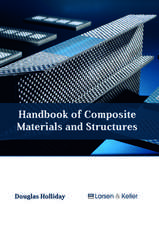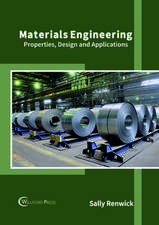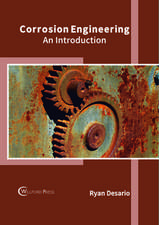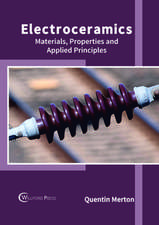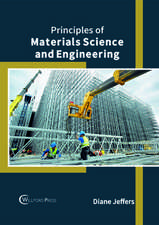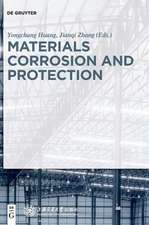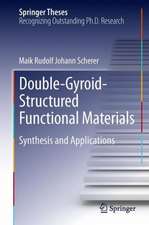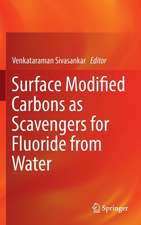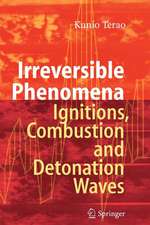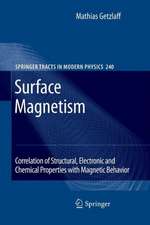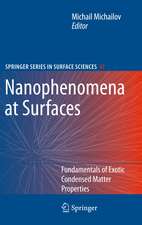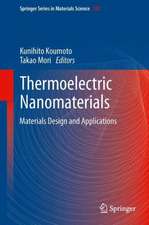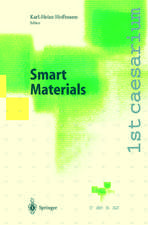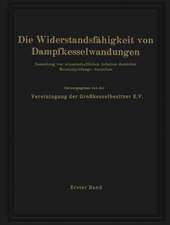Microbial Fuel Cell Technology for Bioelectricity
Editat de Venkataraman Sivasankar, Prabhakaran Mylsamy, Kiyoshi Omineen Limba Engleză Hardback – 14 oct 2018
| Toate formatele și edițiile | Preț | Express |
|---|---|---|
| Paperback (1) | 946.24 lei 6-8 săpt. | |
| Springer International Publishing – 7 ian 2019 | 946.24 lei 6-8 săpt. | |
| Hardback (1) | 952.26 lei 6-8 săpt. | |
| Springer International Publishing – 14 oct 2018 | 952.26 lei 6-8 săpt. |
Preț: 952.26 lei
Preț vechi: 1161.29 lei
-18% Nou
Puncte Express: 1428
Preț estimativ în valută:
182.21€ • 190.24$ • 150.81£
182.21€ • 190.24$ • 150.81£
Carte tipărită la comandă
Livrare economică 05-19 aprilie
Preluare comenzi: 021 569.72.76
Specificații
ISBN-13: 9783319929033
ISBN-10: 3319929038
Pagini: 352
Ilustrații: XVI, 311 p. 95 illus., 86 illus. in color.
Dimensiuni: 155 x 235 x 20 mm
Greutate: 0.64 kg
Ediția:1st ed. 2018
Editura: Springer International Publishing
Colecția Springer
Locul publicării:Cham, Switzerland
ISBN-10: 3319929038
Pagini: 352
Ilustrații: XVI, 311 p. 95 illus., 86 illus. in color.
Dimensiuni: 155 x 235 x 20 mm
Greutate: 0.64 kg
Ediția:1st ed. 2018
Editura: Springer International Publishing
Colecția Springer
Locul publicării:Cham, Switzerland
Cuprins
Chapter 1. Renewable biological sources of energy: Potentials, Progress and Barriers.- Chapter 2.Microbial fuel cell: Fundamentals, types and significance.- Chapter 3.Plant microbial fuel cell technology: Developments and limitations.- Chapter 4.Current advances in Paddy plant microbial fuel cell.- Chapter 5.Algal microbial fuel cells - Promising green energy generators.- Chapter 6.Fungal Fuel Cells - Nature's perpetual energy resource.- Chapter 7.Bio-electricity generation in soil microbial fuel cell using organic waste.- Chapter 8.Microbial fuel cell research using animal waste: A feebly explored area to others.- Chapter 9.Electricigens: Role and prominence in microbial fuel cell performance.- Chapter 10.Rumen fluid microbes for bioelectricity production - A novel approach.- Chapter 11.Advances in concurrent bio-electricity generation and bio-remediation through microbial fuel cells.- Chapter 12.Microbial Desalination Cell - A promising area in microbial fuel cell technology.- Chapter 13.The performance of microbial fuel cells in field trials - A global perspective.- Chapter 14.Future perspectives on cost - effective microbial fuel cells in rural areas.
Notă biografică
Dr. Venkataraman Sivasankar received his doctorate in Chemistry in 2009 from Bharathidasan University, Tiruchirappalli, Tamil Nadu, India. Presently, he is a Post-Doctoral Fellow in the Department of Civil Engineering, Nagasaki University, Nagasaki, Japan. He has been a faculty member in the Department of Chemistry in Pachaiyappa’s College, Chennai, India since 2014. His research areas include materials synthesis and wastewater treatment. He received the prestigious JSPS fellowship in 2016. To his credit, he has more than 50 research articles in Peer – Reviewed journals and five book chapters in volumes with of renowned publishers. He edited a book on Surface Modified Carbons as Scavengers of Fluoride from Water in 2016 with Springer. He collaborates and performs research with professors in universities and research laboratories in Algeria, France, Japan, Iran and South Africa.
Dr. M. Prabhakaran is an Assistant Professor of Botany in Pachaiyappa’s College, Chennai, Tamil Nadu, India. He completed his doctorate in 2012 at the University of Madras, Chennai, India. His research focus is on algal bio-technology which includes algal MFCs. He was awarded the DST – SERB Young Scientist Award in 2013. He has been accredited with a major project (DST) and a minor project from UGC. He is credited with 15 original research papers in national and international peer–reviewed journals, one authored book and five book chapters.
Dr. Kiyoshi Omine is a professor in the Department of Civil Engineering, Graduate School of Engineering, Nagasaki University, Nagasaki, Japan. His research areas of interest include soil microbial fuel cells for composting and power regeneration, geo-technical utilization of waste materials and geo-environmental improvement techniques. He is a member of several technical societies of Japan. He has authored and co-authored more than 50 research papers in national and international peer–reviewed journals. He is credited with mentoring three JSPS fellows in Kyushu and Nagasaki Universities.
Dr. M. Prabhakaran is an Assistant Professor of Botany in Pachaiyappa’s College, Chennai, Tamil Nadu, India. He completed his doctorate in 2012 at the University of Madras, Chennai, India. His research focus is on algal bio-technology which includes algal MFCs. He was awarded the DST – SERB Young Scientist Award in 2013. He has been accredited with a major project (DST) and a minor project from UGC. He is credited with 15 original research papers in national and international peer–reviewed journals, one authored book and five book chapters.
Dr. Kiyoshi Omine is a professor in the Department of Civil Engineering, Graduate School of Engineering, Nagasaki University, Nagasaki, Japan. His research areas of interest include soil microbial fuel cells for composting and power regeneration, geo-technical utilization of waste materials and geo-environmental improvement techniques. He is a member of several technical societies of Japan. He has authored and co-authored more than 50 research papers in national and international peer–reviewed journals. He is credited with mentoring three JSPS fellows in Kyushu and Nagasaki Universities.
Textul de pe ultima copertă
In view of the increased consumption of energy due to the proliferation of electronic devices, this book addresses the trends, similarities, differences and advances in fuel cells of both chemical and biological composition. Fundamentals of microbial fuel cells are described, accompanied by details surrounding their uses and limitations. Chapters on electricigens, microbial group investigations and performance, Rumen Fluid microbes and state-of-the-art advances in microbial fuel cell technology are discussed. The book elaborates upon analytical techniques used for biofilm characterization. It also includes chapters on MFC models that include plant-based MFCs, Algal/Fungi MFCs, MDCs and MFCs using animal waste. A critical review on the performance of MFC technology in field trials is offered in an exclusively dedicated section. By addressing one of the most promising sources for clean and renewable energy, this book fills a pressing need to understand a possible solution for meeting the energy demands in our highly advanced technical world.
Caracteristici
Introduces the fundamentals of Microbial Fuel Cells
Describes how Microbial Fuel Cells can suffice global energy needs by producing bioelectricity
Discusses state-of-the-art microbial fuel cell technologies as well as case studies of its real-world commercial developments and applications
Describes how Microbial Fuel Cells can suffice global energy needs by producing bioelectricity
Discusses state-of-the-art microbial fuel cell technologies as well as case studies of its real-world commercial developments and applications
